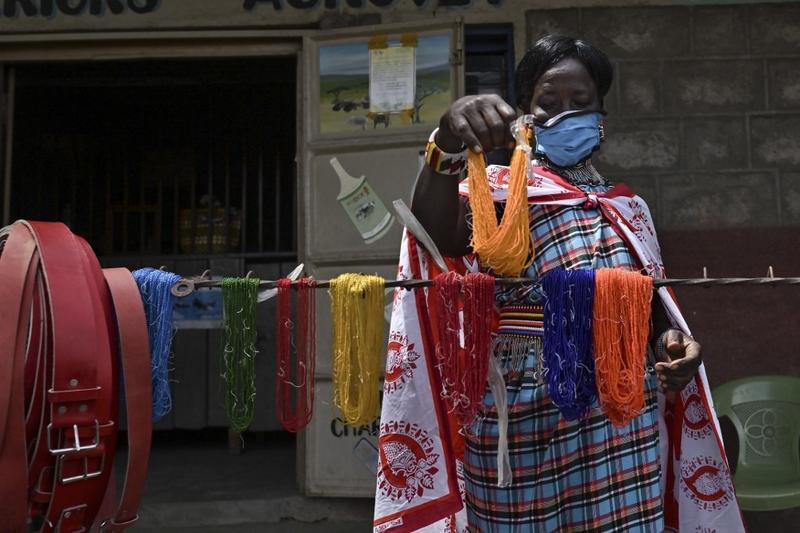 In this June 24 photo, a woman sets up her stand displaying handmade jewelry and leather belts in the hope that she might receive a client in Maasai Mara, Kenya. (TONY KARUMBA / AFP)
In this June 24 photo, a woman sets up her stand displaying handmade jewelry and leather belts in the hope that she might receive a client in Maasai Mara, Kenya. (TONY KARUMBA / AFP)
With the pandemic-induced collapse of the travel industry in Africa, many laid-off workers are scrambling to get by with other work.
On July 6, Kenyatta announced that international flights in and out of Kenya will resume from August 1
Agnes Mucuha, the chief executive officer of the Kenya Association of Travel Agents, said people in her industry have been among the hardest hit by the impact of the travel restrictions brought in to curb the spread of the coronavirus.
"The beginning of the year had so much promise. Kenya had recorded an increase in international arrivals after receiving 1,444,670 arrivals between July 2019 and February 2020, compared to 1,323,548 over the same period last year," Mucuha said.
"Over 90 percent of forward bookings from the month of April were canceled. Our industry forecast on bookings for the period ending July is also extremely depressed as travelers have opted to postpone their travel until the fourth quarter of this year."
ALSO READ: Nile talks founder, escalating tension between Africa powers
Christine Wanjiru is just one of the many in the industry whose lives were turned upside down.
Wanjiru had worked as a receptionist at Nairobi's Bon Voyage travel agency for 10 years and never expected she would one day lose her job.
Wanjiru said her travel agency closed in April but most of the employees-considered nonessential workers during the pandemic-were laid off in March after Kenyan President Uhuru Kenyatta announced a sweeping travel ban. Only Kenyan citizens and foreigners with residency permits were allowed to fly into the East African country.
Challenging times
"The communication we received from our human resources department was that we were being laid off due to a lack of business, but should the situation take a turn, we will be given first priority and be reabsorbed if and when the business needs us," Wanjiru said.
Having found herself jobless since March and with two children to feed, Wanjiru decided to go into business by using her husband's car to collect groceries at Nairobi's Wakulima Market and sell them in the estate where she lives-from the car.
"At first it was challenging. I was used to dressing up and going to the office for an 8 am to 5 pm job, and selling groceries looked like I was stooping low," she said.
"However, having come from the aviation industry, I was aware that people in much more prestigious positions like pilots and air hostesses had lost their jobs and in times of crisis, you have to work with what you have.
"It has been challenging trying to sell groceries from the vehicle. I had to learn fast about where to get the groceries, and convincing customers to buy from me is also difficult.
"Before the virus, I used to have a grocer who I would regularly buy supplies from but now we are like competitors. Convincing such loyal customers to abandon their grocer and buy from you is not easy."
READ MORE: The beat goes on in Africa despite pandemic
Wanjiru hopes she won't be in this position for long and "that humanity will defeat the virus".
"The world cannot be closed forever and I believe a solution for the virus will be found," she said. "Before that happens, we cannot give up hope and resign ourselves to fate."
On July 6, Kenyatta announced that international flights in and out of Kenya will resume from August 1, domestic services will resume from Wednesday.
"We are glad that travel will resume but we may not immediately get our jobs back," Wanjiru said.


